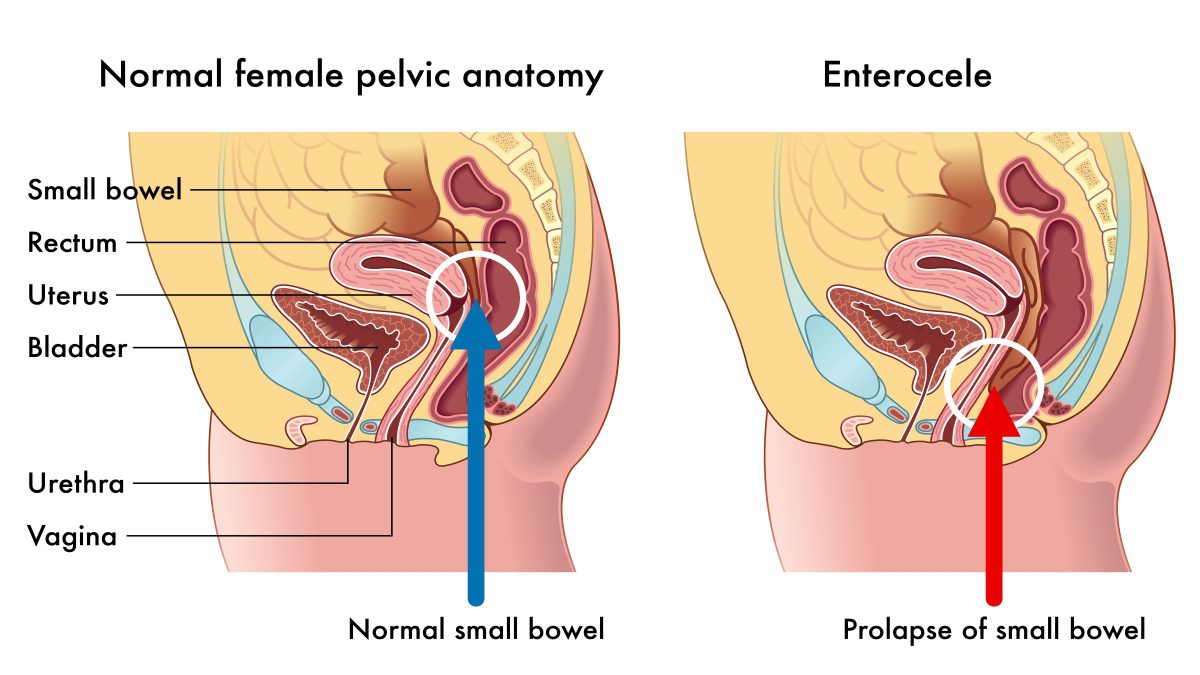What is a small bowel prolapse?
Prolapse of the small bowel occurs when the small intestine (or small bowel) gets pushed down into the lower pelvic cavity and pushes the upper portion of the vagina. As a result, a bulge creates.
Small bowel prolapse can also be called an enterocele.
The risk of experiencing small bowel prolapse increases when your pelvic floor and muscles that support pelvic organs are weakened. The stress and pressure from childbirth, pregnancy, aging, and others factors can cause the weakening of the ligament and muscles supporting the pelvic floor.
Usually, for the management of prolapsed small bowel, non-surgical and self-care methods are available. However, for severe cases, you will need surgery to deal with prolapse.
Symptoms of small bowel prolapse
Mild prolapse of the small bowel may be asymptomatic and cause no signs. Though, if you have a more advanced form of bowel prolapse, you may experience:
- Discomfort in vaginal area and pain during intercourse
- An uncomfortable pulling sensation in your pelvis that becomes less intense as you lie down
- The appearance of a soft bulge of tissue in your vaginal area
- The sensation of fullness, pressure, or even pain in your pelvis
- Painful feelings in your low back that become easier when you lie down
Often, women that experience small bowel prolapse may also encounter the prolapse of other pelvic organs. For example, it can be bladder prolapse, uterus prolapse, rectum prolapse, etc.
When should I see a doctor?
It is important to see a doctor if you are experiencing any bowel prolapse symptoms that disturb you.
Causes of the small bowel prolapse
The most common cause of any type of prolapse is increased pressure on the pelvic floor. Certain conditions and activities may lead to elevation of the pressure on the pelvic floor. Such activities and conditions involve regular lifting of heavy objects or persistent bronchitis and frequent cough, pregnancy and childbirth, obesity, chronic constipation or straining during bowel movements.
How pregnancy and childbirth affect the development of bowel prolapse
Among the most common causes for the development of pelvic organs prolapses are pregnancy and childbirth. However, it doesn’t mean that all women that gave birth may have a prolapse. As well as the fact that the woman didn’t give birth doesn’t exclude the chance of prolapse development. Some women have strong enough muscles, fascia and ligaments in the pelvis to avoid prolapse after pregnancy and childbirth.
The muscles, ligaments, and fascia supporting your vagina stretch and weaken as you go through labour and pregnancy. It leads to pelvic organs prolapse.
Risk factors
The development of prolapse is associated with certain factors. Such factors include:
- Age. The risk of small bowel prolapse development increases as we get older. The main cause is that with age, muscles in our body become weaker, and we lose muscle mass. The same thing happens with your pelvic muscles. Therefore, aging contributes to bowel prolapse development.
- Increased abdominal pressure. Increased pressure in your abdomen contributes to the development of bowel prolapses. Overweight, chronic cough, straining during bowel movements, and other factors may lead to increased pressure in your stomach.
- Pelvic surgery. If you underwent removal of the uterus (hysterectomy) or surgical incontinence treatment, you’re at higher risk of experiencing bowel prolapse.
- Smoking. Due to frequent coughing, smoking increases abdominal pressure, which in turn causes prolapse.
- Pregnancy and childbirth. As mentioned above, vaginal delivery elevates the risk of the development of pelvic organs prolapse because it may weaken the supporting muscles and ligaments of the pelvic floor. There is a correlation between the number of pregnancies the woman gives and the risk of prolapse development. In this way, the risk increases with each pregnancy. However, women who had only cesarean delivery are at lower risk.
- Connective tissue disorders. Some people are prepossessed for small bowel prolapse development. Due to genetic features, these people have weaker connective tissue in their pelvic area. Therefore, they are more susceptible to experiencing pelvic organs prolapse.
- Race. The risk of developing pelvic organ prolapse is higher for Hispanic and white women.
Prevention of small bowel prolapse
You can reduce your chances of experiencing small bowel prolapse by following such tips:
- Treat a continuous cough
- Maintain healthy weight
- Avoid smoking
- Escape lifting of heavy objects
- Prevent constipation
Click Here to read about Treatment.
















Leave a Reply
You must be logged in to post a comment.